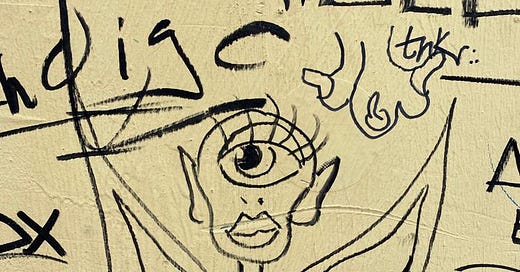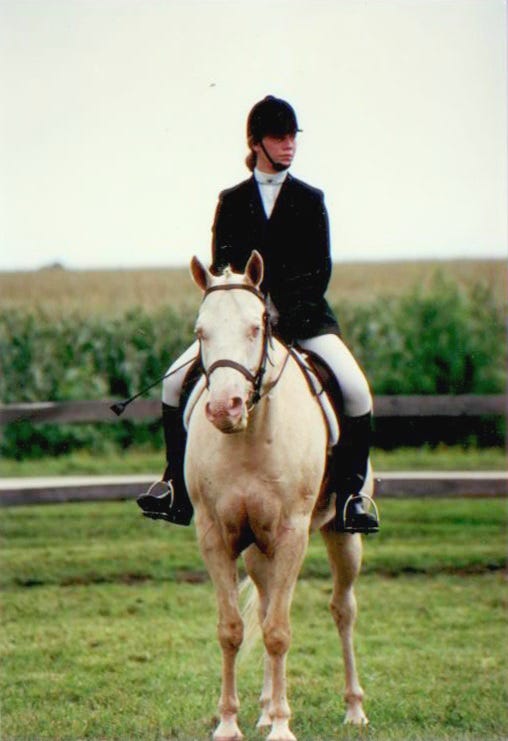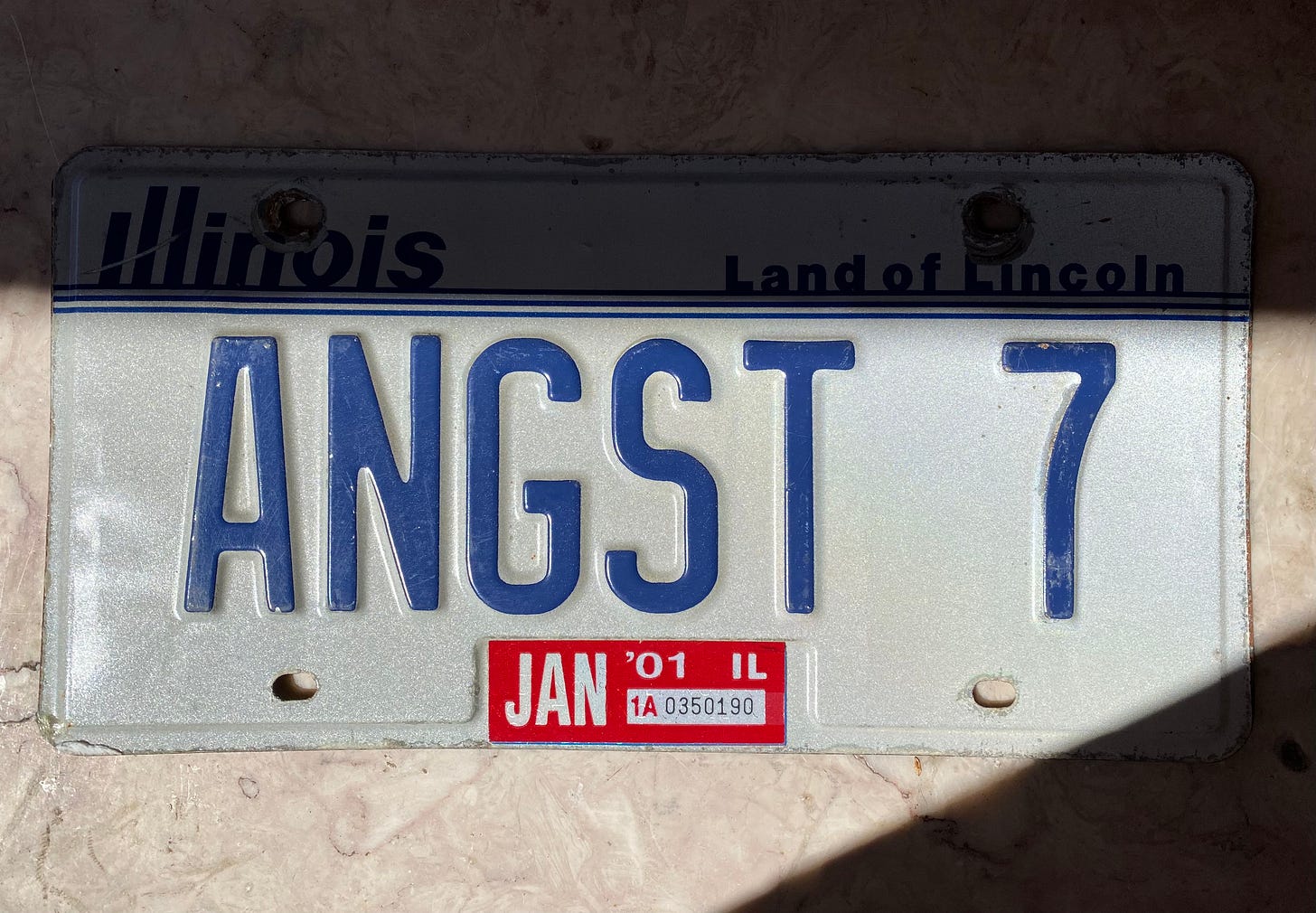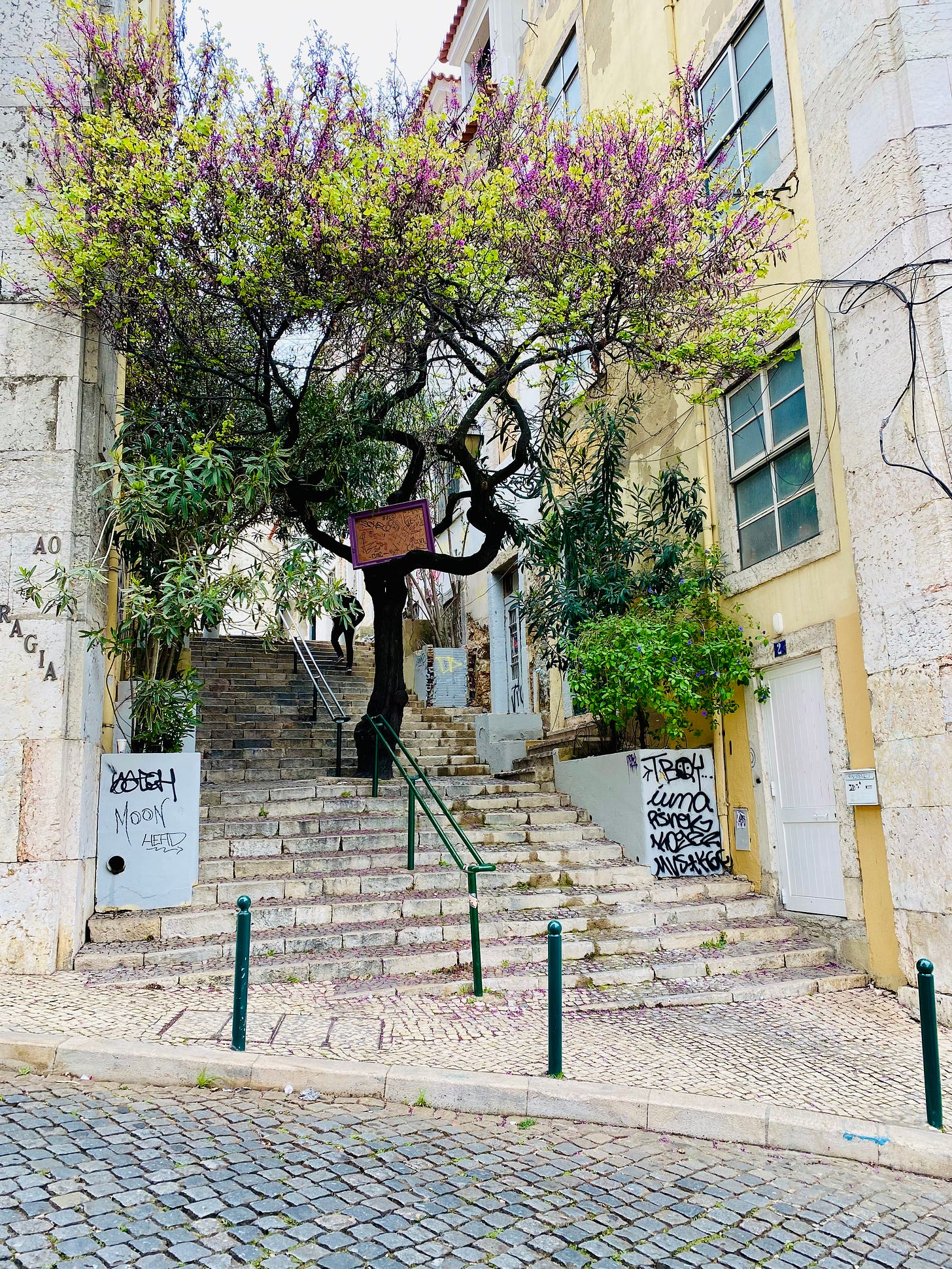Several weeks ago, a reader named Harriet asked, “When and how do you feel that you belong?” Ever since, I can’t stop thinking about what it truly means to belong; weighing first in one hand and then the other how much belonging does—or doesn’t—matter.
Harriet was referring specifically to my emigration to Portugal, but it’s hard to separate the sense of belonging here, in this particular place, from a sense of belonging anywhere, ever.
It feels like a true thing to say that I’ve never really felt like I belonged. But then, it’s difficult to belong when you resist joining. And I have always resisted.
I have an early memory of one of my grandmothers asking if I would like a Cabbage Patch Kid for my birthday. This was in the early 1980s, when the (hideously) chipmunk-cheeked dolls were all the rage. My grandmother asked rhetorically, assuming that, as I was a small girl-child, of course my answer would be an enthusiastic yes.
She didn’t know me very well.
I remember a rising feeling of disgust as I answered her, “Uh, no I would not like a Cabbage Patch Kid. I don’t want to have the same thing everybody else has.” And then, under the heat of my mother’s eagle-eyed glare, I tacked on a graceless, “I mean, no thank you.”
I don’t remember giving the question any amount of thought—my rejection was instant, undiluted instinct. I liked dolls well enough, but I didn’t want a doll just because everyone else had it. I didn’t covet belonging like that. I felt an innate resistance to the pull of the herd. I wanted to stand apart, even if that meant I stood alone.
As far as I can recall, I always felt this way.
I have never fit in with the usual peer groups. In school, I wasn’t popular or cool. I wasn’t a jock. I wasn’t a brain. I wasn’t a cheerleader or a beauty. Nor was I a recluse or a rebel. I just did what I liked. I played a little sports, and blew a flute in the school band. I sought out parts in school plays and wasn’t shy about excelling in English—or sucking in Algebra. While other girls twittered about which boys were cutest, I drew pictures of my quarter horse, Fantasia, in the margins of my notebook.
Would I have fit in, if I tried? I don’t know, because I have rarely been interested in belonging that way, in slapping a label on myself and mirroring the people around me. That said, there have been a few notable exceptions throughout my life:
Jesus People
You could easily call it brainwashing, since my parents claimed Christianity as their own before I was born. I was brought up in a variety of small-town churches, and schooled K-12 in a private Christian school run by an über strict Baptist sect.
As a child, I loved the security of knowing that the adults in my life had all the answers—and that they were the right answers, because Jesus said so. Over and over, it was drilled into my head that as Bible-swinging, God-fearing, Purity-obsessed believers, we were special. Set apart from “the world” and all the evils therein. We were few, we were mighty, we were misunderstood (persecuted, even!), and we were going to inherit the kingdom of God. It was heady stuff for a kid who was already preoccupied with significance.
Of course, that sense of rightness, of belonging-ness, fell apart in my teens and twenties when my breadcrumb trail of questions led me up and out and away. But for a few formative years, being a believer ticked all my boxes.
2. Generation XAs soon as I discovered that my birthdate dropped me smack in the middle of Gen X, I was proud to belong to “the forgotten generation.” Born in the years 1965-1980, we were the misfits and weirdos sandwiched between the overbearing Boomers (1946-1964) and the spotlight-hogging Millennials (1981-1996).
I took an outsized amount of delight in belonging to this overlooked, angst-ridden, slacker stereotyped generation. An essay I wrote in the 90s titled “This Is Who I Am” began like so:
“We speak the same words, you and I. But not the same language. I am not like most of you. Neither are my friends. And the truth is, I like being unlike you. I like my big, complicated shoes and my industrial rock and my black fingernail polish. I don’t mind at all that I’m part of Generation X. I rather like the label. I even put the word ANGST on my license plate.”
3. The Goths
In my early 20s, I happened upon a dance club in downtown Chicago inhabited by people clad in black. Black clothes, black hair, black nails, black lips. The shadows were deep, the music was pulsing and moody. The Dome Room felt dangerous and mysterious and I had never seen anything like in it all of my sheltered, well-churched, GAP-jeaned, Bryan Adams-tuned years. I was entranced. I was converted. I was goth.
Within months, I had scoured all the thrift stores for armfuls of night shades; pulled the stompiest (platform) combat boots from the shelves of the Clark Street Army/Navy surplus shop. (This was pre-Hot Topic, ya’ll. Punk/goth style wasn’t pre-printed and mass-produced. We had to create it ourselves. Get off my lawn!)For the first time in my life, I felt like I had found my people. Here were my fellow misfits, artists, and rebels who had always been a touch too strange. It was intoxicating. “Have you seen darkness dance? I have. It does. It looks like this,” I scrawled in my journal, ecstatic in the throes of discovery. I quickly became a faithful club kid, haunting the Dome Room dance floor every Friday, Saturday, Sunday night. Braving the punk crowd at Exit, mingling with vampires at Neo.
I loved that scene as I had once loved the church, with rapture and devotion. But even still, I stayed mostly on the sidelines, in the shadows, darting out to writhe in the strobe lights when the DJ spun Nine Inch Nails. I wasn’t quite hardcore enough to truly belong, I thought. I was still too farm girl, too Jesus freak, too soft and virginal. I liked the idea of being an outcast, but I was fresh out of college, a reporter at a suburban newspaper. I had to pay rent, I had to stay somewhat respectable. And I wasn’t sure just how deep I wanted to dive.
So while I dyed my hair dark and gave black a starring role in my wardrobe, I also inked my new tattoos on skin that could be easily hidden, and reserved my tube of black lipstick for club nights only. I welcomed the witchy label, but only if I could hold it by the edges. As ever, I didn’t want to be swallowed whole. I would be goth, sure, but I would be my own version of it. I would take from the scene what I liked and fashion myself a statement. Even if it took the rest of my twenties and a good swathe of my thirties to figure out what that statement actually was.

I think I liked these labels—Believer, GenX-er, Gothling—because they were outliers. Those of us who belonged embraced non-conformity en masse. Even if our non-conformity itself was conformity, within the strictures of those particular groups.
For far too many years of my life, in and outside of these groups, I thought there was something wrong with me. Wrong in the sense of being not-normal. (This was before I realized that normality is a myth.) In the Jesus days, my failure to fully commit was sinful. The more questions I asked about our faith, the further I pulled away from the flock. The further the flock pulled away from me.
Once, when I was 15, the principal of my fanatical Baptist school asked if I was a witch. “I sense a spirit of rebellion in you,” he scolded, looming over me, “and the Bible says rebellion is as the sin of witchcraft.”
Years later, I would bear his accusation like a badge of honor. At the time, wobbling toward independence, I was mortified and confused. If the adults in my life saw something wrong with me, didn’t that make it true?
I carried the weight of wrongness for a very long time, chastising myself for not being a joiner, for being too difficult, too emotional, too contrarian.
As I grew older, I went gentler on myself. I could look back and recognize the things that were not true, the things that didn’t matter. It was a shock, though, just a handful of years ago, to take the Enneagram Type test and see my results.
I had taken personality tests before, but Myers-Briggs (INFJ) and StrengthsFinder didn’t do much for my perspective. The Enneagram, however, was eye-opening. It’s not just knowing my own type, but discovering the Enneagram number of others in my life—coworkers, family, partner. I believe it’s led to more empathy and understanding all around.
My results—all three times I took the test—were resoundingly Enneagram Four: The Individualist. The description of a Four, in part, reads:
“Fours are self-aware, sensitive, and reserved. They are emotionally honest, creative, and personal, but can also be moody and self-conscious. Withholding themselves from others due to feeling vulnerable and defective, they can also feel disdainful and exempt from ordinary ways of living. They typically have problems with melancholy, self-indulgence, and self-pity. Their basic fear is that they have no identity or personal significance. Their basic desire, then, is to find themselves and their significance (to create an identity).
Fours want to express themselves and their individuality, to create and surround themselves with beauty, to maintain certain moods and feelings, to withdraw to protect their self-image, to take care of emotional needs before attending to anything else, to attract a "rescuer."
We have named this type The Individualist because Fours maintain their identity by seeing themselves as fundamentally different from others. Fours feel that they are unlike other human beings, and consequently, that no one can understand them or love them adequately. They often see themselves as uniquely talented, possessing special, one-of-a-kind gifts, but also as uniquely disadvantaged or flawed. More than any other type, Fours are acutely aware of and focused on their personal differences and deficiencies.
Healthy Fours are honest with themselves: they own all of their feelings and can look at their motives, contradictions, and emotional conflicts without denying or whitewashing them. They may not necessarily like what they discover, but they do not try to rationalize their states, nor do they try to hide them from themselves or others. They are not afraid to see themselves “warts and all.” Healthy Fours are willing to reveal highly personal and potentially shameful things about themselves because they are determined to understand the truth of their experience—so that they can discover who they are and come to terms with their emotional history. This ability also enables Fours to endure suffering with a quiet strength. Their familiarity with their own darker nature makes it easier for them to process painful experiences that might overwhelm other types.”
Reading that for the first time was like a blow to the head. It reverberated like a validation.
My need to wave my individuality around like some kind of defiant banner, to resist joining, to seek out significance, to embrace even my darkest emotions—these things were never defects. They weren’t sinful. They were just… me.
What a burden to lay down! What a joy to simply exist, and to revel—unapologetically—in all the ways I am myself.
So I circle back, then, to the question that brought me here. The question of belonging, when and how.
When I was 28 years old, I left Illinois with Marido and moved to San Francisco. I never felt like I fit in the Midwest, and I was, at that point, searching for a sense of belonging. San Francisco was where the misfits migrated. It was the Promised Land of the weirdos and malcontents. I thought I’d make more sense there.
And I did, for years. I was at home. I belonged. But looking back with 20 years of hindsight (from the other side of the Atlantic), I see that my sense of belonging came not so much from the place as from the people I found there, and the people who found me. It came from the feeling of being truly seen and known and still wanted and accepted. No longer did I think, “If they only knew X about me, they wouldn’t want me here.”
There is an argument to be made, of course, that we all found each other because we were in San Francisco, drawn by the city’s affinity for misfits. So maybe both things can be true: I belonged in San Francisco, the city, and I belonged with the people to whom I gave my heart.
To belong, Webster’s says, is to be suitable, appropriate, or advantageous. To be in a proper situation; or to be the property of a person or thing. Technically, to belong is to be attached or bound—by birth, allegiance, or dependency. To be a member of a club, organization, or set. To be an attribute. To be properly classified, like an intransitive verb.
Belonging can mean fitting in, passing as, comfortably assimilating. In my current reality, to belong in Portugal could mean understanding the culture, fluency in the language, changing my name to João.
Or maybe none of that would matter. In the end, none of my facility of language or familiarity with the culture made a difference in how at home I felt in the country of my birth.
To think of belonging as fitting in is to understand it as something that happens to you. It’s a belonging that requires others—the club, the country, the clique—to accept you. This version of belonging is external, and as such it doesn’t carry much weight with me. It is, as I titled this post, not the most important thing.
There is a different take on belonging, though, which is seeing it as something that happens internally. Seeing belonging not as a passive act of others or an application for entry, but as a choice that you get to make. A choice to accept yourself, regardless of what others think or believe or feel about you. This inward belonging means you are so sure of who you are that you don’t need or want to conform to others requirements.
If you truly belong within yourself, then you can belong anywhere, can’t you?
Here is the crux of it, after weeks of thought and hundreds of words spun across this page: It is not belonging that I am truly after. Not here, not anywhere. Rather, it is connection.
I know, within myself, that I belong. I belong to myself. I belong with Filha and Marido. I belong with the people to whom I’ve given my love. And so I am not searching to belong in Portugal. I don’t know that I would ever succeed in acquiring that, anyway.
What I am searching for here is connection—to the people I meet, no matter who they are or where they are from. To the country and customs. To the way of living that is so different from what I normalized in the States. I’m searching for connection to the land—and I’ve found it, I think, at Oliveira do Paraiso.
In this way, in making these connections, I will build my own house of belonging in this new place. I can already feel it happening.
A postscript: This whole thought exercise has reminded me of a Mary Oliver poem I dearly love. It also led me to discover a new poem by David Whyte that I’d never read before. I’m including both of these gorgeous things here for you…
Wild Geese
by Mary Oliver
You do not have to be good.
You do not have to walk on your knees
for a hundred miles through the desert repenting.
You only have to let the soft animal of your body
love what it loves.
Tell me about despair, yours, and I will tell you mine.
Meanwhile the world goes on.
Meanwhile the sun and the clear pebbles of the rain
are moving across the landscapes,
over the prairies and the deep trees,
the mountains and the rivers.
Meanwhile the wild geese, high in the clean blue air,
are heading home again.
Whoever you are, no matter how lonely,
the world offers itself to your imagination,
calls to you like the wild geese, harsh and exciting
over and over announcing your place
in the family of things.
The House of Belonging
by David Whyte
I awoke
this morning
in the gold light
turning this way
and that
thinking for
a moment
it was one
day
like any other.
But
the veil had gone
from my
darkened heart
and
I thought
it must have been the quiet
candlelight
that filled my room,
it must have been
the first
easy rhythm
with which I breathed
myself to sleep,
it must have been
the prayer I said
speaking to the otherness
of the night.
And
I thought
this is the good day
you could
meet your love,
this is the gray day
someone close
to you could die.
This is the day
you realize
how easily the thread
is broken
between this world
and the next
and I found myself
sitting up
in the quiet pathway
of light,
the tawny
close grained cedar
burning round
me like fire
and all the angels of this housely
heaven ascending
through the first
roof of light
the sun has made.
This is the bright home
in which I live,
this is where
I ask
my friends
to come,
this is where I want
to love all the things
it has taken me so long
to learn to love.
This is the temple
of my adult aloneness
and I belong
to that aloneness
as I belong to my life.
There is no house
like the house of belonging.
Copyright © 2022 LaDonna Witmer









This is such an eloquent and thoughtful reflection on the question of belonging, thank you. I read it several times and was struck by the intersections with my current reading of Brené Brown's "Atlas of the Heart" in which she also talks about the difference between fitting in (adjusting yourself) and belonging (accepting yourself). "Because we can feel belonging only if we have the courage to share our most authentic selves with people, our sense of belonging can never be greater than our level of self-acceptance." You express this so well.
I also returned to Toko-pa Turner's "Belonging: Remembering Ourselves Home", a book that I've worked with for several years now. She argues that belonging is a set of skills, not simply a state of being. She has a lovely dedication/blessing at the front that may resonate with some:
"For the rebels and the misfits, the black sheep and the outsiders. For the refugees, the orphans, the scapegoats, and the wierdos. For the uprooted, the abandoned, the shunned and invisible ones.
May you recognize in increasing vividness that you know what you know.
May you give up your allegiances to self-doubt, meekness, and hesitation.
May you be willing to be unlikeable, and in the process be utterly loved.
May you be impervious to the wrongful projections of others, and may you deliver your disagreements with precision and grace.
May you see, with the consummate clarity of nature moving through you, that your voice is ot only necessary, but desperately needed to sing us out of this muddle.
May you feel shored up, supported, entwined, and reassured as you offer yourself and your gifts to the world.
May you know for certain that even as you stand by yourself, you are not alone."
Magnificent piece of writing! Thank you for this beautiful gift.
The two poems are a lovely desert to your reflections. It was the final lines of Mary Oliver’s poem The Summer Day (Tell me, what do you plan to do with your one wild and precious life?) that made my decision to move to Portugal clear.